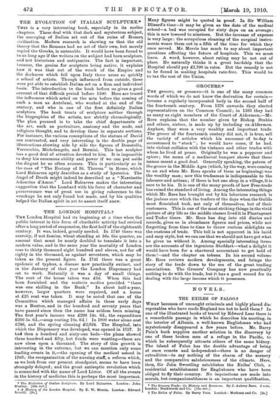GROCERS.*
THE grocers, or grossers—it is one of the many common words of which we do not know the derivation for certain— became a regularly incorporated body in the second half of the fourteenth century. From 1376 onwards they elected representatives on the Common Council ; in 1383 they had as many as eight members of the Court of Aldermen,—Mr. Rees explains that the number given by Bishop Stubbs and others, sixteen, is made up by including ex-Aldermen. Anyhow, they were a very wealthy and important trade. The grocer of the fourteenth century did not, it is true, sell the variety of articles which his successor of to-day is accustomed to " stock " ; he would have come, if he had, into violent collision with the vintners and other trades with whom he lived at peace. Originally be was a pepperer and spicer ; the menu of a mediaeval banquet shows that these names meant a good deal. Generally speaking, the patron of the grocer in the Middle Ages (which, by the way, were coming to an end when Mr. Rees speaks of them as beginning) was the wealthy man ; now this tradesman is indispensable to the labourer and artisan; if there is but one shop in a village, it is sure to be his. It is one of the many proofs of how Free-trade has raised the standard of living. Among the interesting things which Mr. Rees has brought out by his laborious research is the jealous care which the traders of the days when the Guilds most flourished took, not only of themselves, but of their customers. This is one of the most striking things in the vivid picture of city life as the middle classes lived it in Plantagenet and Tudor times. Mr. Rees has dug into old diaries and records, gives us in abundance figures and prices, while not forgetting from time to time to throw curious sidelights on the customs of trade. This toil is not apparent in his lucid and easy style, but we can see that we should not have got what be gives us without it. Among specially interesting items are the accounts of the ingenious Stoddart—what a delight it would have been for a chartered accountant to get hold of them!—and the chapter on tokens. In his second volume Mr. Rees reviews modern developments, and brings the story of the trade down to the era of the great trading associations. The Grocers' Company has now practically nothing to do with the trade, but it has a good record for its dealing with the large income which it possesses.










































 Previous page
Previous page